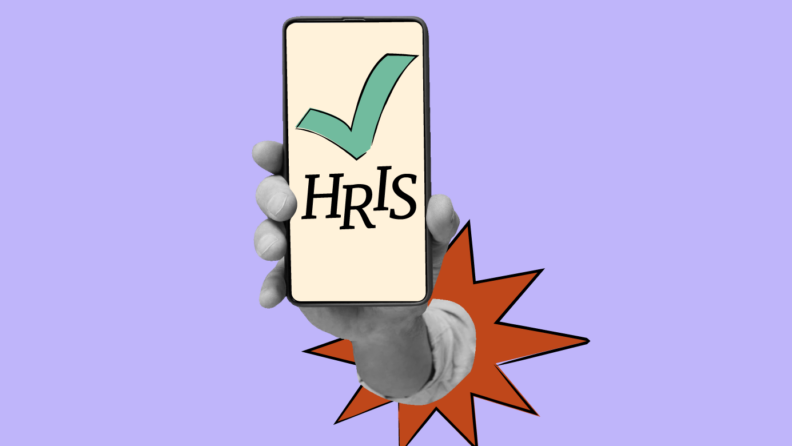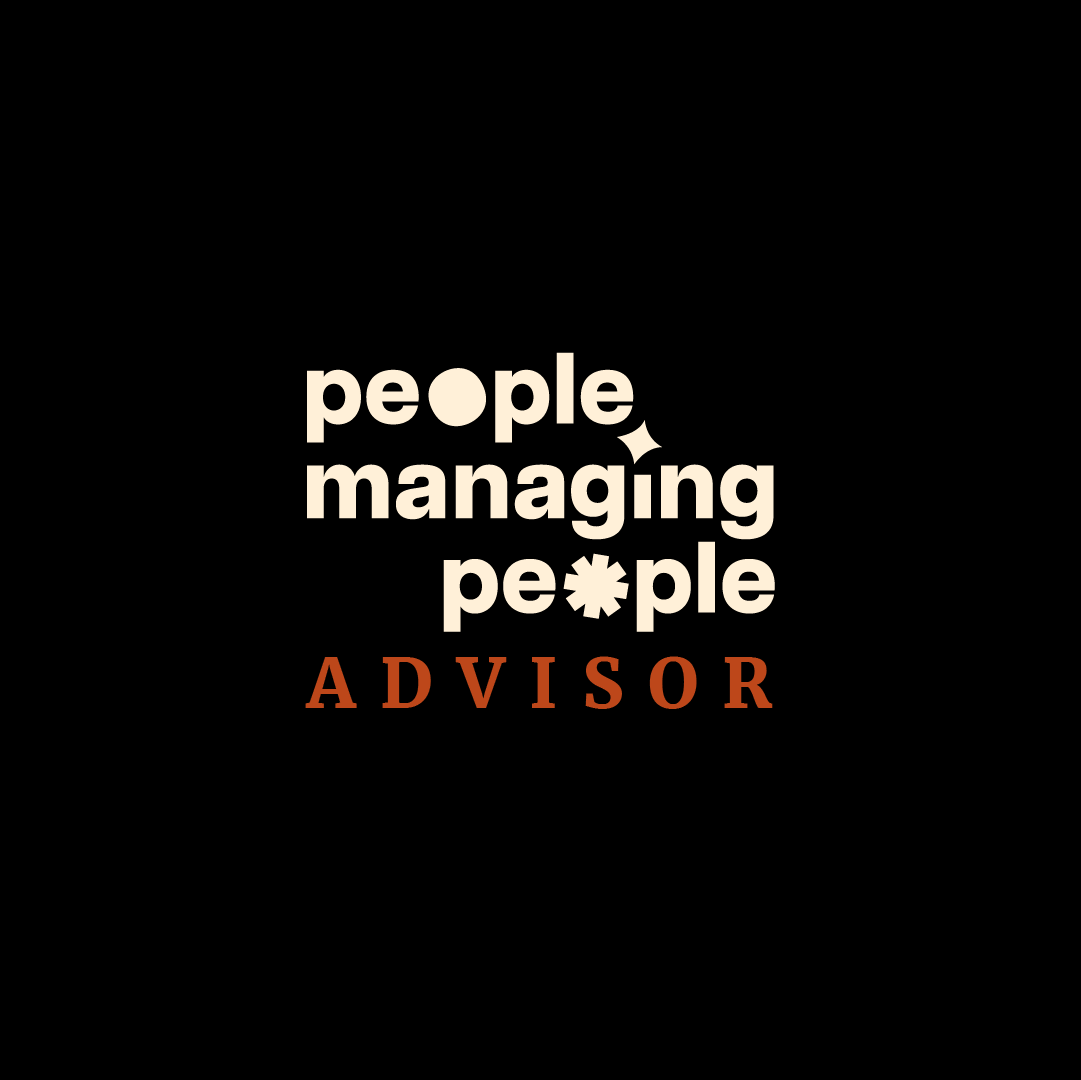You’ve heard about HRIS software, but you’re not sure exactly what it is or if it’s worth the investment.
Read on to learn all about the functions of an HRIS and how they can benefit your organization.
What Is A Human Resources Information System?
An HRIS (human resource information system) is a type of HR software used by organizations to store and manage employee data.
It serves as a central repository for employee records and helps automate and streamline various HR tasks.
HRIS Benefits
HRISs are key compontents of HR's digital transformation. Even small startups can benefit from a basic HRIS and they’re a must for larger organizations. Key benefits of using an HRIS include:
- Centralized data: Provides a single location for all recruitment database systems, improving accessibility and organization.
- Improved efficiency: Automates HR tasks such as inputting employee info, reducing manual work and saving time.
- Enhanced accuracy: Minimizes human errors in payroll, attendance, and record-keeping.
- Better decision-making: Provides data and reporting to inform talent management strategies.
- Employee self-service: Empowers employees to access and manage their own information, reducing HR workload.
- Compliance support: Helps ensure the organization meets legal and regulatory requirements.
- Cost savings: Reduces administrative costs by streamlining HR processes and reducing paperwork.
- Scalability: Helps organizations adapt to growth with flexible modules.
- Improved employee engagement: Enhances employee satisfaction with easy access to personal information and HR services.
10 Key HRIS Functions
Let’s take a look at how an HRIS can benefit your business with these 10 key functions.
1. Core HR
Core HR refers to the basic functions carried out by the HR department related to employee information:
- Personal details
- Job role details
- Contracts
- Visas, work permits, and I-9 forms (in the U.S.).
- Training and certification history.
An HRIS saves HR professionals time by storing all employee information in one central, easily accessible location (your HR database), and even more time with the enablement of employee self-service (employees can update their own info, book holidays, etc).
An HRIS analyst (more on this later) can run various reports to give insights into workforce management, business trends, and future needs by analyzing core HR data like demographics, turnover rates, job-role requirements, and even skills.
2. Employee scheduling
An HRIS enables managers to create, adjust, and share schedules while factoring in employee availability, leave, and labor regulations.
Key features often include shift-swapping tools, conflict alerts, real-time updates, and integrations with time-tracking systems to ensure accurate scheduling and workforce management.
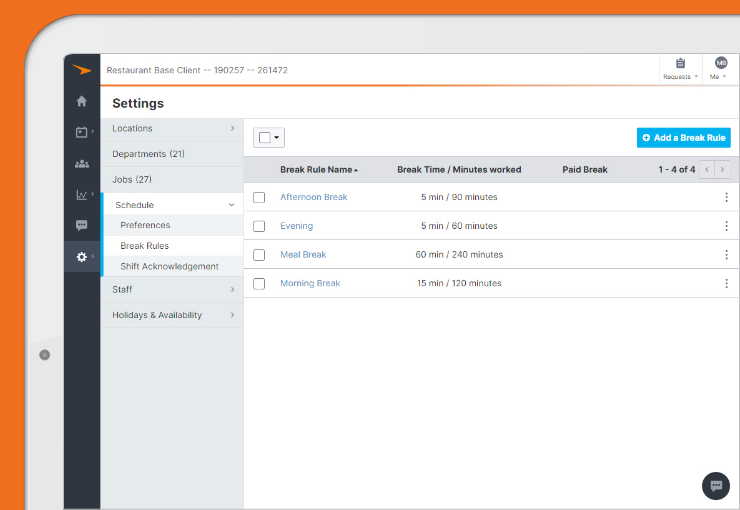
3. Payroll
HRIS can help with payroll processing by automating calculations and ensuring accuracy and compliance.
It integrates time and attendance data, such as hours worked, overtime, and deductions, to streamline salary computations and tax compliance.
Additionally, it reduces errors, supports direct deposits, and provides detailed payroll reports for efficient financial management.
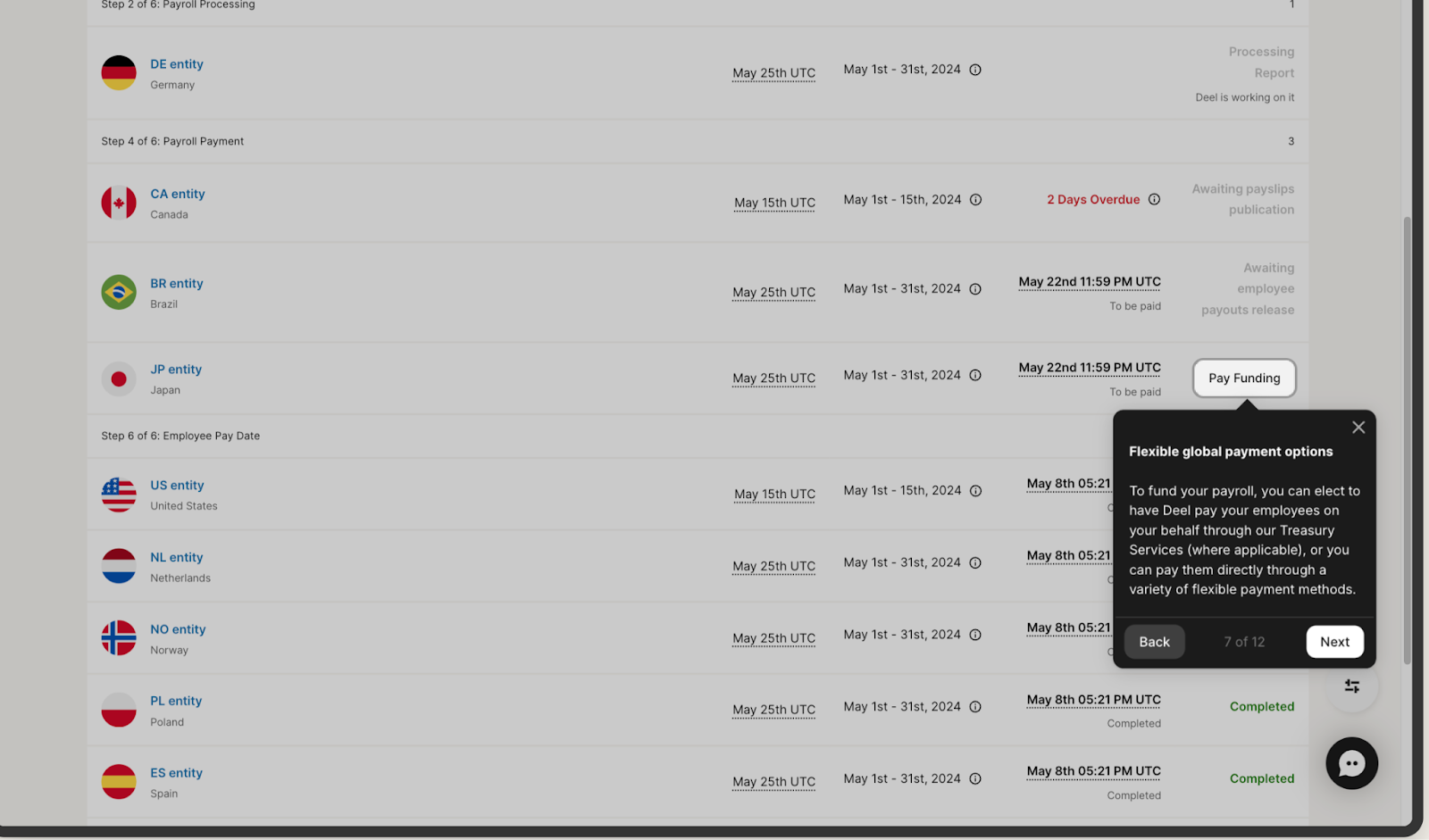
4. Benefits administration
HRIS software provides self-service options for employees to review their benefits information and streamlines open enrollment periods.
Workers have the ability to make approved changes to their benefit information when life changes occur.
This function also allows employees to look up benefit information when they have questions about things like:
- Medical coverage
- Life Insurance
- Disability benefits
- Dependent benefit information.
5. Training and development
HRIS training modules help create and disseminate required training and keep track of team member’s qualifications, certifications, and skills.
HRIS training functions also allow for quick distribution of updated policies and procedures.
Solutions such as Lattice below enable the creation of leadership development pathways make it easy to launch individual career development plans tied in with continuous performance management.
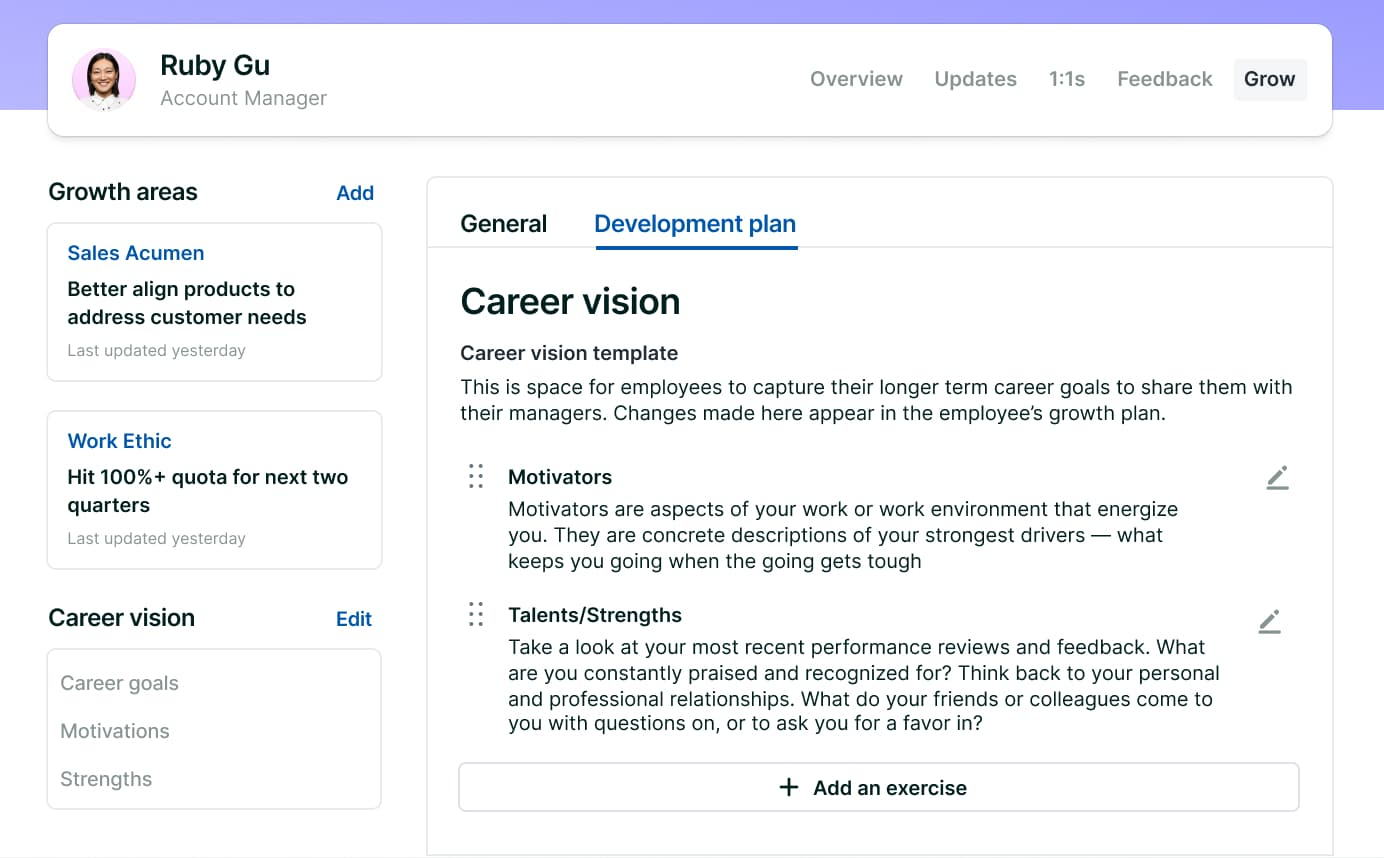
Plus, tools can be integrated with an (learning management system) to streamline available training and transcripts into one easily accessible location.
6. Performance management
Performance management needs like goal-setting, self-assessments, and anonymous surveys are all options available through an HRIS.
These features enable teams to conduct performance reviews, share feedback, and set goals.
While it’s important to have engaged evaluation meetings with your staff, some areas of performance evaluations can be completed by an employee on their own – an effective way to encourage honest reflection and increased participation.
Plus, this saves you time and streamlines the process.
For a more comprehensive approach to human resource management, explore our curated list of HR software platforms that can seamlessly integrate with your HRIS.
7. Time tracking and leave management
HRIS software allows for easy and accurate time tracking and tracking the amount of leave taken.
This function allows for additional self-sufficiency. Team members enter their own leave requests for approval and time is saved by reducing the need for emailing back and forth, making phone calls, and fielding in-person requests.
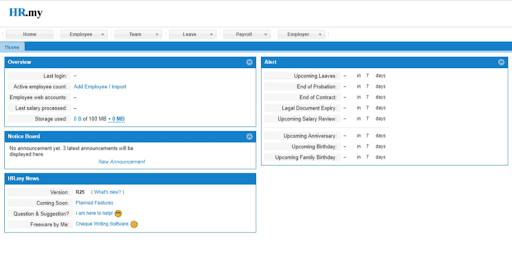
8. Recruitment
HRIS implementation is a game-changer when it comes to recruitment with candidate sourcing and applicant tracking features:
- Create jobs ads and automatically post them to multiple jobs boards
- Apply selection standards to applications received
- Collate resumes and candidate data
- Track candidates' progress through the recruitment process
- Create a candidate database for future hiring.
Recruitment software features make HRIS software especially beneficial for companies with high turnover rates because you can improve your hiring practices and expectations of employee standards without having to invest a lot of time and resources.
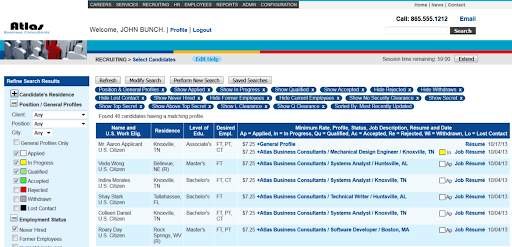
9. Onboarding
An HRIS streamlines the onboarding process by automating document collection, allowing new hires to complete forms and paperwork online.
It facilitates consistent onboarding workflows, helping to track progress and ensure that all necessary tasks, such as background checks and training, are completed in a timely manner.
The system also provides new employees with access to essential company policies and resources, improving their understanding of their role and company culture.
10. Compliance
An HRIS helps organizations maintain HR compliance by providing updates on regulatory changes, keeping the organization informed of new requirements, and generating detailed reports for audits.
Additionally, HRIS tracks certifications, training, and legal documentation to ensure that employees meet the necessary qualifications and safety standards.
Choosing an HRIS
HRIS solutions provide options based on the specific needs of your business. To help you choose the best solution for you, you'll want to consider questions like HRIS pricing and:
- How many employees do you have, perhaps an HRIS for small businesses might be a better option?
- What are your business needs e.g. save time on admin tasks and provide a better employee experience? This will help you define your feature list
- What are your plans for growth?
- What’s your budget?
- What kind of return on investment (ROI) would you expect to see?
- Who will be using the new tool, will it need to span jurisdictions?
- Which tools in your HR tech stack will the software either replace or need to integrate with?
You can see a full process in our article on HR software selection or dive deeper into the differences between HRIS, HRMS, and HCM systems to get a better idea of the best type of HR management software for your needs.
Also, taking an HRIS credential can equip you to fully utilize the capabilities of HRIS systems.
10 Best HRIS Systems Shortlist
Here’s a shortlist of the best HRIS systems to streamline your core HR functions, out of the 30 options I reviewed:
Need expert help selecting the right Human Resources (HR) Software?
If you’re struggling to choose the right software, let us help you. Just share your needs in the form below and you’ll get free access to our dedicated software advisors who match and connect you with the best vendors for your needs.
Subscribe To The People Managing People Newsletter
For more advice on HRISs and other forms of HR software, subscribe to our weekly newsletter for HR and business leaders. You’ll receive all our latest content to help you grow in your career and make greater impact in your organization.

